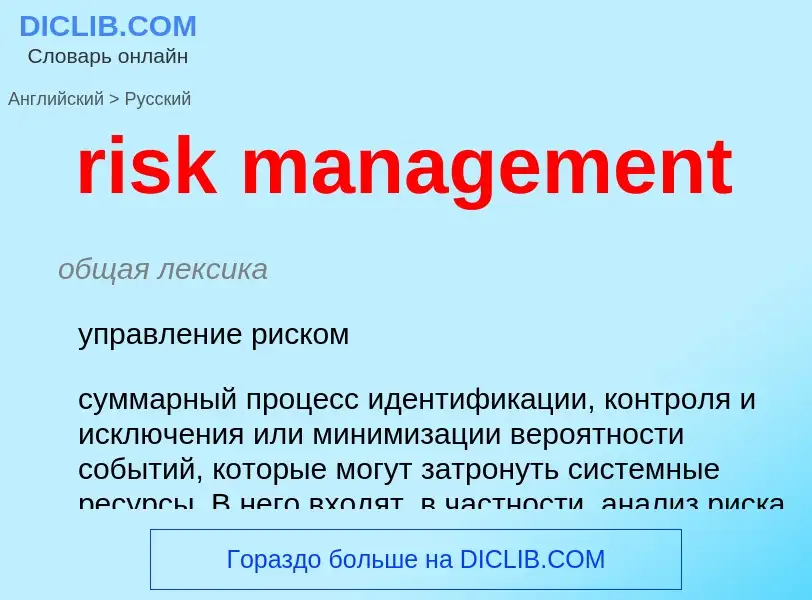Translation and analysis of words by ChatGPT artificial intelligence
On this page you can get a detailed analysis of a word or phrase, produced by the best artificial intelligence technology to date:
- how the word is used
- frequency of use
- it is used more often in oral or written speech
- word translation options
- usage examples (several phrases with translation)
- etymology
risk management - translation to English
общая лексика
управление риском
суммарный процесс идентификации, контроля и исключения или минимизации вероятности событий, которые могут затронуть системные ресурсы. В него входят, в частности, анализ риска, соотношения затраты/выгоды, расчет безопасности систем защиты и общий обзор вопросов, связанных с безопасностью
Смотрите также
Definition
Wikipedia

Risk management is the identification, evaluation, and prioritization of risks (defined in ISO 31000 as the effect of uncertainty on objectives) followed by coordinated and economical application of resources to minimize, monitor, and control the probability or impact of unfortunate events or to maximize the realization of opportunities.
Risks can come from various sources including uncertainty in international markets, threats from project failures (at any phase in design, development, production, or sustaining of life-cycles), legal liabilities, credit risk, accidents, natural causes and disasters, deliberate attack from an adversary, or events of uncertain or unpredictable root-cause.
There are two types of events i.e. negative events can be classified as risks while positive events are classified as opportunities. Risk management standards have been developed by various institutions, including the Project Management Institute, the National Institute of Standards and Technology, actuarial societies, and ISO standards (quality management standards to help work more efficiently and reduce product failures). Methods, definitions and goals vary widely according to whether the risk management method is in the context of project management, security, engineering, industrial processes, financial portfolios, actuarial assessments, or public health and safety. Certain risk management standards have been criticized for having no measurable improvement on risk, whereas the confidence in estimates and decisions seems to increase.
Strategies to manage threats (uncertainties with negative consequences) typically include avoiding the threat, reducing the negative effect or probability of the threat, transferring all or part of the threat to another party, and even retaining some or all of the potential or actual consequences of a particular threat. The opposite of these strategies can be used to respond to opportunities (uncertain future states with benefits).
As a professional role, a risk manager will "oversee the organization's comprehensive insurance and risk management program, assessing and identifying risks that could impede the reputation, safety, security, or financial success of the organization", and then develop plans to minimize and / or mitigate any negative (financial) outcomes. Risk Analysts support the technical side of the organization's risk management approach: once risk data has been compiled and evaluated, analysts share their findings with their managers, who use those insights to decide among possible solutions. See also Chief Risk Officer, internal audit, and Financial risk management § Corporate finance.


